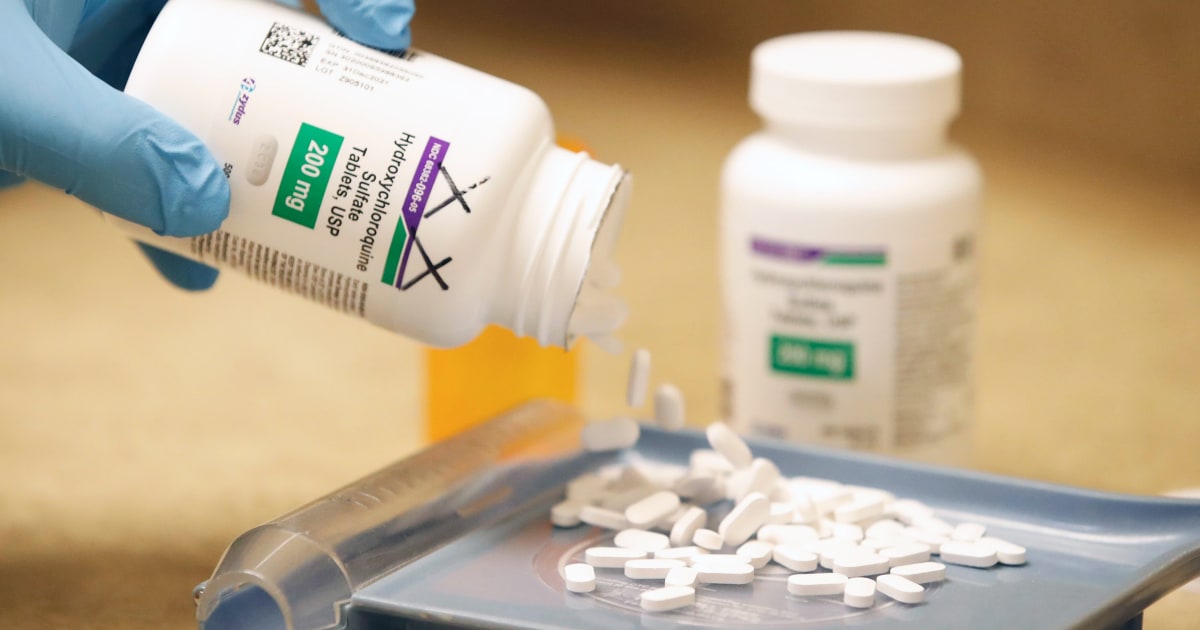to be totally honest I have not given much thought to Trump and this drug because well how much credibility does he have. right.
so for the past two hours I spent some time researching this issue. here are my conclusions and you can differ and argue but my conclusions are based on the recommendations from the New England Medical Journal. What you need to ask yourself is who do you trust. Is the NEMJ in on some type of fix. Do all those professionals and doctors want to see people die like mr gates? how about that stat, a huge number of crazies think he is involved with this pandemic.
the bottom line is in the first paragraph last sentence. these people did the actual work and they say: we do not support the use of this drug. do you think Trump has super powers and his opinions are more valid than the professionals. hmm. Remember this is the guy that also wanted to inject poisons. He is also the guy who thinks our planes are invisible. His track record is pretty shitty, I don't care if you like him or hate him, his lies and BS are documented.
here is another bottom line. I hope the FCKIN drug works. I know it won't but I pray it will. unlike some of you far right assholes who hope every single progressive idea fails (btw how is that working out) I hope and pray for my country and for the world that it works, or something finally works.
I have no problem writing/saying hey he was right for once. I want him to be right. I would gladly give up and lose a discussion if that means hundreds of thousands of people live and don't suffer. WTF do I care about an argument in a politics section with idiots who are placing full trust on a con man who has no medical knowledge and BS and lies every second.
last point, tell me why these idiots will wager even a tiny bit of credibility on D Trump. seriously they know he lies, they know he is a phony, they know he knows nothing about medicine. why go out on a limb with this issue. are you retarded. I and most people know you are truly stupid, I and others prove that almost daily. But, are you retarded? that is much different than stupid. Dwightieanne is retarded there is not doubt about that. Maybe, the rest of you are just ordinary stupid. but, an adult who can't make change--well convince me he isn't retarded.
Discussion
In this analysis involving a large sample of consecutive patients who had been hospitalized with Covid-19, the risk of intubation or death was not significantly higher or lower among patients who received hydroxychloroquine than among those who did not (hazard ratio, 1.04; 95% CI, 0.82 to 1.32). Given the observational design and the relatively wide confidence interval, the study should not be taken to rule out either benefit or harm of hydroxychloroquine treatment. However, our findings do not support the use of hydroxychloroquine at present, outside randomized clinical trials testing its efficacy.
As we noted in the introduction, the findings from an early study showing a benefit of hydroxychloroquine in 26 patients who had been treated in French hospitals are difficult to interpret, given the small size of that study, the lack of a randomized control group, and the omission of 6 patients from the analysis.6 A clinical trial testing two doses of chloroquine in patients with Covid-19 planned to include 440 patients but was halted after 81 patients had been enrolled because of excessive QTc prolongation and an indication of higher mortality in the high-dose group (in which patients received 600 ** twice daily for 10 days) than in the low-dose group (in which patients received 450 ** daily for 4 days after an initial dose of 450 ** administered twice on the first day).12
Two small, randomized trials from China have been reported. Physicians in Wuhan randomly assigned 62 patients with mild illness to either the control group (in which patients could receive supplemental oxygen, unspecified antiviral agents, antibiotic agents, and immune globulin, with or without glucocorticoids) or the experimental group (in which patients also received 400 ** of hydroxychloroquine daily). This report has not yet been fully peer-reviewed, but results were posted to the MedRxiv website for public comment.13 Investigators reported a faster mean time to clinical recovery (resolution of fever and cough and improvement on chest radiography) in the experimental group than in the control group. Four patients (all in the control group) had progression to severe infection. A small, randomized trial involving 30 patients in Shanghai reported on outcomes in patients treated with 400 ** of hydroxychloroquine daily for 5 days, as compared with a control group in which patients received “conventional treatment only.”14 This trial showed that by day 7, a total of 86% of the patients in the hydroxychloroquine-treated group and 93% of those in the control group had negative results on viral throat swabs. All the patients in this trial also received aerosolized interferon alfa by nebulizer.
A randomized clinical trial is the best approach to determine whether benefit can be ascribed to any given therapeutic intervention because this trial design minimizes the two major problems inherent in observational studies: unmeasured confounding and bias. With the analytic approaches we used in this examination of our observational cohort, we have tried to minimize possible confounding in a variety of ways.
In the main analysis, a multivariable regression model with inverse probability weighting according to the propensity score, there was no significant association between hydroxychloroquine use and the risk of intubation or death. We also performed a series of analyses using several propensity-score approaches. Findings were similar in multiple sensitivity analyses. The consistency of the results across these analyses is reassuring. In our analysis, we adjusted for likely confounders, including age, race and ethnic group, body-mass index, diabetes, underlying kidney disease, chronic lung disease, hypertension, baseline vital signs, Pao2:Fio2, and inflammatory markers of the severity of illness. Despite this extensive adjustment, it is still possible that some amount of unmeasured confounding remains. Additional limitations of our study include missing data for some variables and potential for inaccuracies in the electronic health records, such as lack of documentation of smoking and coexisting illness for some patients. Nonetheless, we used contemporary methods to deal with missing data to minimize bias. Finally, the single-center design may limit the generalizability of these results.
Clinical guidance at our medical center has been updated to remove the suggestion that patients with Covid-19 be treated with hydroxychloroquine. In our analysis involving a large sample of consecutive patients who had been hospitalized with Covid-19, hydroxychloroquine use was not associated with a significantly higher or lower risk of intubation or death (hazard ratio, 1.04; 95% CI, 0.82 to 1.32). The study results should not be taken to rule out either benefit or harm of hydroxychloroquine treatment, given the observational design and the 95% confidence interval, but the results do not support the use of hydroxychloroquine at present, outside randomized clinical trials testing its efficacy.
Oh, one more issue. I am assuming most or all of you know this drug has or had become scarce because Trump pushed it. So obviously these people who bought it used it. are there any doctors/hospitals reporting miracles? hmmm, how long has Trump been pushing it? by now you might think doctors/hospitals would be reporting a ton of success. anything?? even anecdotal evidence I would find interesting.
and incidentally no way in one billion years is Trump taking that drug. why because he is a liar and he knows he is BS. you think that yellow bastard would take a chance on something he knows is a lie. he is too yellow, too corrupt and just too fckin much.
so for the past two hours I spent some time researching this issue. here are my conclusions and you can differ and argue but my conclusions are based on the recommendations from the New England Medical Journal. What you need to ask yourself is who do you trust. Is the NEMJ in on some type of fix. Do all those professionals and doctors want to see people die like mr gates? how about that stat, a huge number of crazies think he is involved with this pandemic.
the bottom line is in the first paragraph last sentence. these people did the actual work and they say: we do not support the use of this drug. do you think Trump has super powers and his opinions are more valid than the professionals. hmm. Remember this is the guy that also wanted to inject poisons. He is also the guy who thinks our planes are invisible. His track record is pretty shitty, I don't care if you like him or hate him, his lies and BS are documented.
here is another bottom line. I hope the FCKIN drug works. I know it won't but I pray it will. unlike some of you far right assholes who hope every single progressive idea fails (btw how is that working out) I hope and pray for my country and for the world that it works, or something finally works.
I have no problem writing/saying hey he was right for once. I want him to be right. I would gladly give up and lose a discussion if that means hundreds of thousands of people live and don't suffer. WTF do I care about an argument in a politics section with idiots who are placing full trust on a con man who has no medical knowledge and BS and lies every second.
last point, tell me why these idiots will wager even a tiny bit of credibility on D Trump. seriously they know he lies, they know he is a phony, they know he knows nothing about medicine. why go out on a limb with this issue. are you retarded. I and most people know you are truly stupid, I and others prove that almost daily. But, are you retarded? that is much different than stupid. Dwightieanne is retarded there is not doubt about that. Maybe, the rest of you are just ordinary stupid. but, an adult who can't make change--well convince me he isn't retarded.
Discussion
In this analysis involving a large sample of consecutive patients who had been hospitalized with Covid-19, the risk of intubation or death was not significantly higher or lower among patients who received hydroxychloroquine than among those who did not (hazard ratio, 1.04; 95% CI, 0.82 to 1.32). Given the observational design and the relatively wide confidence interval, the study should not be taken to rule out either benefit or harm of hydroxychloroquine treatment. However, our findings do not support the use of hydroxychloroquine at present, outside randomized clinical trials testing its efficacy.
As we noted in the introduction, the findings from an early study showing a benefit of hydroxychloroquine in 26 patients who had been treated in French hospitals are difficult to interpret, given the small size of that study, the lack of a randomized control group, and the omission of 6 patients from the analysis.6 A clinical trial testing two doses of chloroquine in patients with Covid-19 planned to include 440 patients but was halted after 81 patients had been enrolled because of excessive QTc prolongation and an indication of higher mortality in the high-dose group (in which patients received 600 ** twice daily for 10 days) than in the low-dose group (in which patients received 450 ** daily for 4 days after an initial dose of 450 ** administered twice on the first day).12
Two small, randomized trials from China have been reported. Physicians in Wuhan randomly assigned 62 patients with mild illness to either the control group (in which patients could receive supplemental oxygen, unspecified antiviral agents, antibiotic agents, and immune globulin, with or without glucocorticoids) or the experimental group (in which patients also received 400 ** of hydroxychloroquine daily). This report has not yet been fully peer-reviewed, but results were posted to the MedRxiv website for public comment.13 Investigators reported a faster mean time to clinical recovery (resolution of fever and cough and improvement on chest radiography) in the experimental group than in the control group. Four patients (all in the control group) had progression to severe infection. A small, randomized trial involving 30 patients in Shanghai reported on outcomes in patients treated with 400 ** of hydroxychloroquine daily for 5 days, as compared with a control group in which patients received “conventional treatment only.”14 This trial showed that by day 7, a total of 86% of the patients in the hydroxychloroquine-treated group and 93% of those in the control group had negative results on viral throat swabs. All the patients in this trial also received aerosolized interferon alfa by nebulizer.
A randomized clinical trial is the best approach to determine whether benefit can be ascribed to any given therapeutic intervention because this trial design minimizes the two major problems inherent in observational studies: unmeasured confounding and bias. With the analytic approaches we used in this examination of our observational cohort, we have tried to minimize possible confounding in a variety of ways.
In the main analysis, a multivariable regression model with inverse probability weighting according to the propensity score, there was no significant association between hydroxychloroquine use and the risk of intubation or death. We also performed a series of analyses using several propensity-score approaches. Findings were similar in multiple sensitivity analyses. The consistency of the results across these analyses is reassuring. In our analysis, we adjusted for likely confounders, including age, race and ethnic group, body-mass index, diabetes, underlying kidney disease, chronic lung disease, hypertension, baseline vital signs, Pao2:Fio2, and inflammatory markers of the severity of illness. Despite this extensive adjustment, it is still possible that some amount of unmeasured confounding remains. Additional limitations of our study include missing data for some variables and potential for inaccuracies in the electronic health records, such as lack of documentation of smoking and coexisting illness for some patients. Nonetheless, we used contemporary methods to deal with missing data to minimize bias. Finally, the single-center design may limit the generalizability of these results.
Clinical guidance at our medical center has been updated to remove the suggestion that patients with Covid-19 be treated with hydroxychloroquine. In our analysis involving a large sample of consecutive patients who had been hospitalized with Covid-19, hydroxychloroquine use was not associated with a significantly higher or lower risk of intubation or death (hazard ratio, 1.04; 95% CI, 0.82 to 1.32). The study results should not be taken to rule out either benefit or harm of hydroxychloroquine treatment, given the observational design and the 95% confidence interval, but the results do not support the use of hydroxychloroquine at present, outside randomized clinical trials testing its efficacy.
Oh, one more issue. I am assuming most or all of you know this drug has or had become scarce because Trump pushed it. So obviously these people who bought it used it. are there any doctors/hospitals reporting miracles? hmmm, how long has Trump been pushing it? by now you might think doctors/hospitals would be reporting a ton of success. anything?? even anecdotal evidence I would find interesting.
and incidentally no way in one billion years is Trump taking that drug. why because he is a liar and he knows he is BS. you think that yellow bastard would take a chance on something he knows is a lie. he is too yellow, too corrupt and just too fckin much.










